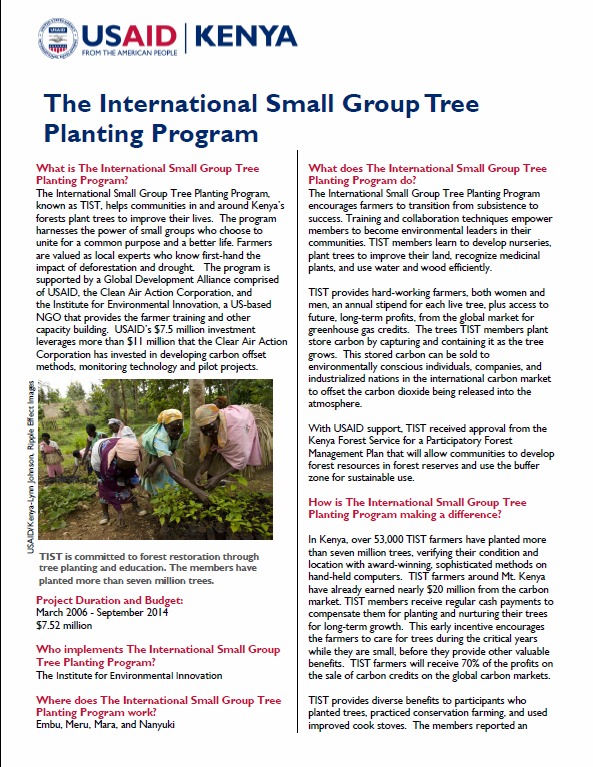Funding Level:
$7.6 million
Duration:
March 2009 – March 2014
Activity Goals:
- Improve smallholder livelihoods
- Improve the environment
- Women and Youth empowerment
Activity Accomplishments:
- Reached sustainability through carbon sales
- Certified under the Verified Carbon Standard, which has already issued 361,000 tons of credits
- Validated and Verified under the Climate, Community, Biodiversity Alliance Standard “Gold” (first in the world)
- More than 55,000 TIST farmers have benefited from the Global Development Alliance
- Women and Youth fully integrated and represented on the TIST Leadership Council
- Improved 18,000 hectares of biologically significant land
- Planted more than 13 million trees
Key Partners:
Kenya Forest Service
Global Development Alliance comprised of USAID, the Clean Air Action Corporation, and the Institute for Environmental Innovation
Activity Locations:
Bomet, Embu, Meru, Narok, Tharaka Nithi, Kirinyaga and Laikipia.
ACTIVITY OVERVIEW
The International Small Group and Tree Planting Program (TIST) is a combined tree planting, development and carbon program that was partially funded by USAID/Kenya. Smallholder and subsistence farmers organize themselves to plant trees on their degraded land to improve their livelihoods and address local, regional and global environmental issues such as deforestation, biodiversity loss, adaptation and vulnerability to climate change.
TIST provides a new revenue stream from the international carbon market in the form of payments for environmental services. Farmers work together to create an asset (trees and their carbon), which survives drought, floods and provides food in time of famine.
Deforestation is a major cause of poverty and global climate change. TIST has proven that farmers can reverse deforestation, improve their lives, and combat climate change.
ACTIVITY AREAS
TIST encourages farmers to transition from subsistence to success. Its training and collaboration techniques empower members to become environmental leaders in their communities. Participants learn to develop nurseries, plant trees to improve their farms, recognize medicinal plants, use water and wood efficiently, and improve their health and nutrition.
TIST provides hard-working farmers, women and men, an annual stipend for each live tree, plus access to future long-term profits from the global market for greenhouse gas credits. The trees that farmers plant store carbon as the trees grow. This stored carbon is certified and sold to environmentally conscious individuals, companies, and industrialized nations in the international carbon market to offset the carbon dioxide they release into the atmosphere.
TIST received approval from the Kenya Forest Service for a Participatory Forest Management Plan that will allow communities to develop indigenous forests in protected forest reserves. USAID supports TIST through a Global Development Alliance that has benefited more than 55,000 TIST farmers, their families and 18,000 hectares of biologically significant land.
ACTIVITY IMPACT
Margaret Gitonga, 50, is a TIST member with a special mission. Disabled by polio at the age of eight, Margaret has gathered a group of other villagers coping with physical and mental handicaps in this unforgiving landscape. She is vocal and fearless, petite, unstoppable as she drags her leg beside her. Not a burden, but a reminder that she can overcome any obstacle, whether it's a stranger's attitude, or physical barriers. Education is often withheld from disabled people in Kenya, so the TIST training "has made me feel at home with myself," she says, "doing anything is possible."
She has traveled widely to train others, including briefing forestry graduate students on the carbon business. She has studied the many levels of TIST "best practices" and participates regularly in a TIST practice called "building up," where each person is lifted up by positive comments shared within the group. Out in the world, "we are not considered as people," Margaret says but "in my Small Group I am like any other, an independent woman in my home.”
Margaret is part of the Muguna Disabled Group, started in 2005, whose three-dozen members have the passion of converts. Often these people are passed by and ignored by the larger population. It is assumed they have neither the resources, nor the capability, to be full members of a social, cultural or environmental group. But the Muguna Small Group has proven everyone wrong by being one of the most productive groups in TIST. Margaret says that TIST has given them the practical tools for group and individual development, seeing them as equal partners. It is that sense of belonging and belief that has these folks in the dirt planting, selecting seeds for the next crop of trees, and sharing best practices at Cluster Meetings.
The messages planted by TIST are uplifting in a practical sense, bringing information about tools such as special low fuel use stoves (like the one in Margaret's kitchen), and irrigation techniques. But they are also supportive in a spiritual sense, lifting self-esteem and a sense of accomplishment that is especially important.
USAID Contact:
Enock Kanyanya, Activity Manager
USAID/Kenya
Office of Agriculture, Business and Environment
Tel: +254 0721 371357
Email: ekanyanya@usaid.gov
The International Small Group and Tree Planting Program Contact:
Charlie Williams, Clean Air Action Corporation
The International Small Group and Tree Planting (TIST) Program
Tel: +1 720.394.2112 | +1 918.747.8770
Email: charliewilliams@cleanairaction.com
Website:
www.tist.org
Updated May 2014








Comment
Make a general inquiry or suggest an improvement.